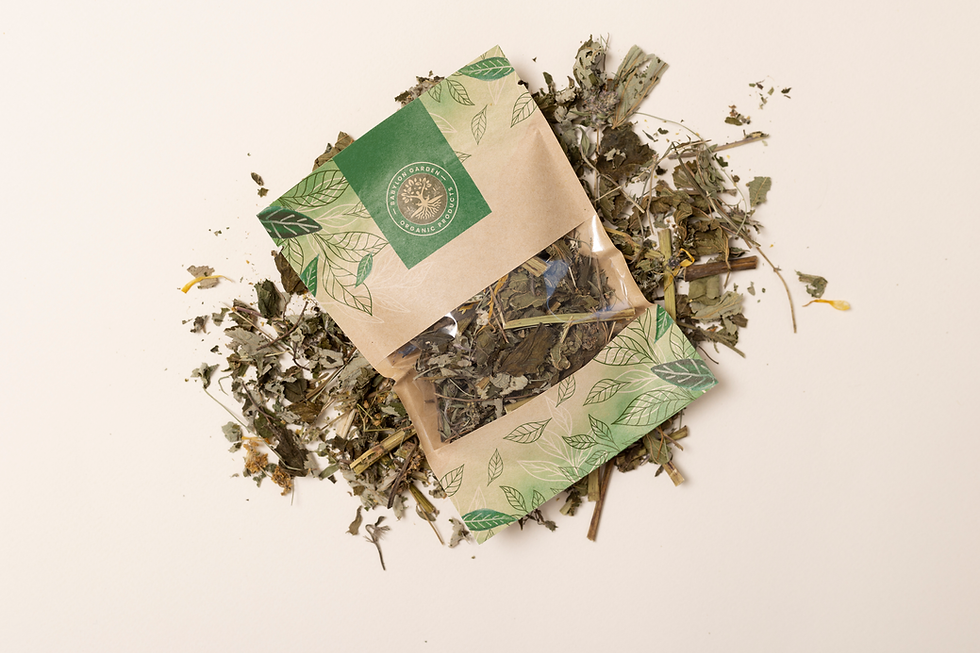
Candida, Yeast, and Fungal Overgrowth: The Hidden Link to Chronic Illness and Mental Health?
- babylongardenstore
- Aug 21, 2025
- 3 min read
In recent years, more attention has been given to the role of gut health in overall well-being—including mental and emotional health. One topic that continues to generate discussion is Candida overgrowth.
What Is Candida?
Candida is a type of yeast that naturally lives in the human body, particularly in the gut, mouth, and skin. The most common species is Candida albicans, found in more than 70% of the population. While it’s usually harmless in small amounts, problems can arise when it grows out of balance.
Candida isn’t just a digestive issue—it may be linked to a range of health problems, both physical and mental.
💫💫💫
How Candida Affects the Body
Biofilms: Candida's Defense Mechanism
Candida can form biofilms—a protective, jelly-like matrix that surrounds the fungal cells. This biofilm shields it from the immune system and antifungal treatments, making overgrowth difficult to control.
Common Physical Symptoms of Candida Overgrowth
Candida overgrowth may contribute to:
Recurrent yeast infections
Digestive issues: bloating, gas, and food fermentation
Body odor and unpleasant discharge
Skin problems: acne, eczema, dandruff, rashes
Oral thrush and a white-coated tongue
Genital itching or diaper rash
Itchy ear canals
Other signs to look out for:
Sugar cravings and addictive tendencies
Seasonal allergies or food sensitivities
Itchy skin, especially during detox
Fatigue, insomnia, and mood swings
💫💫💫
Candida and Mental Health
Many people are unaware of how deeply Candida may impact the nervous system and brain chemistry. Toxins released by Candida can interfere with the production of neurotransmitters, potentially leading to:
Anxiety
Depression
Brain fog
ADHD-like symptoms
These connections are still being studied, but growing evidence suggests the gut-brain link plays a key role in our emotional well-being.
💫💫💫
Why Candida Overgrows
Several factors can trigger Candida overgrowth:
Antibiotic overuse
Weakened immune system
High intake of refined carbs and sugars
Chronic stress
Poor gut health
Hormonal imbalances
Candida is incredibly adaptive. It can mutate, rearrange its genes, and develop resistance to treatments—including antifungal drugs, oxidative stress, and even temperature changes.
💫💫💫
The Sugar Connection: Not All Sugars Are Equal
There’s a common belief that sugar feeds Candida. This is partly true, but it’s important to understand the difference between types of sugars.
Sugars that Promote Candida Growth:
Refined sugars (sucrose, dextrose, maltose)
Processed foods
Starches (breads, pasta, grains)
Artificial sweeteners
Sugars that May Help:
On the other hand, natural sugars in fruits and vegetables (simple sugars like monosaccharides) don’t feed Candida in the same way. In fact, in a balanced diet, they may support the body in eliminating fungal overgrowth.
💫💫💫
The Role of the Adrenals and Metabolism
The adrenal glands help regulate sugar metabolism. In modern society, adrenal fatigue is increasingly common, which can make it harder for the body to process sugars efficiently—leading to fermentation, which then feeds yeast, fungi, and mold.
💫💫💫
Detox and Die-Off Symptoms
When starting a cleanse or Candida protocol, it’s not uncommon to experience a temporary increase in symptoms like:
Itching
Fatigue
Irritability
Digestive discomfort
This is often referred to as the Candida die-off effect, as the body begins to eliminate the excess yeast.
💫💫💫
In Summary
Candida overgrowth may be more widespread than we realize—and its effects reach far beyond digestion. From mood and mental clarity to skin health and immune function, fungal imbalance could be a root cause of many chronic symptoms.
While it’s not the only contributor to health problems, it’s a common companion to many conditions and deserves more attention in the conversation about holistic health.
💫💫💫
Remember: Before beginning any Candida cleanse or antifungal protocol, consult with a qualified healthcare practitioner, especially if you have chronic health conditions.
💫💫💫
“Don’t feed it what it needs to thrive. Fruits reveal the body's weaknesses—not create them.”
— Karen Lee




Comments